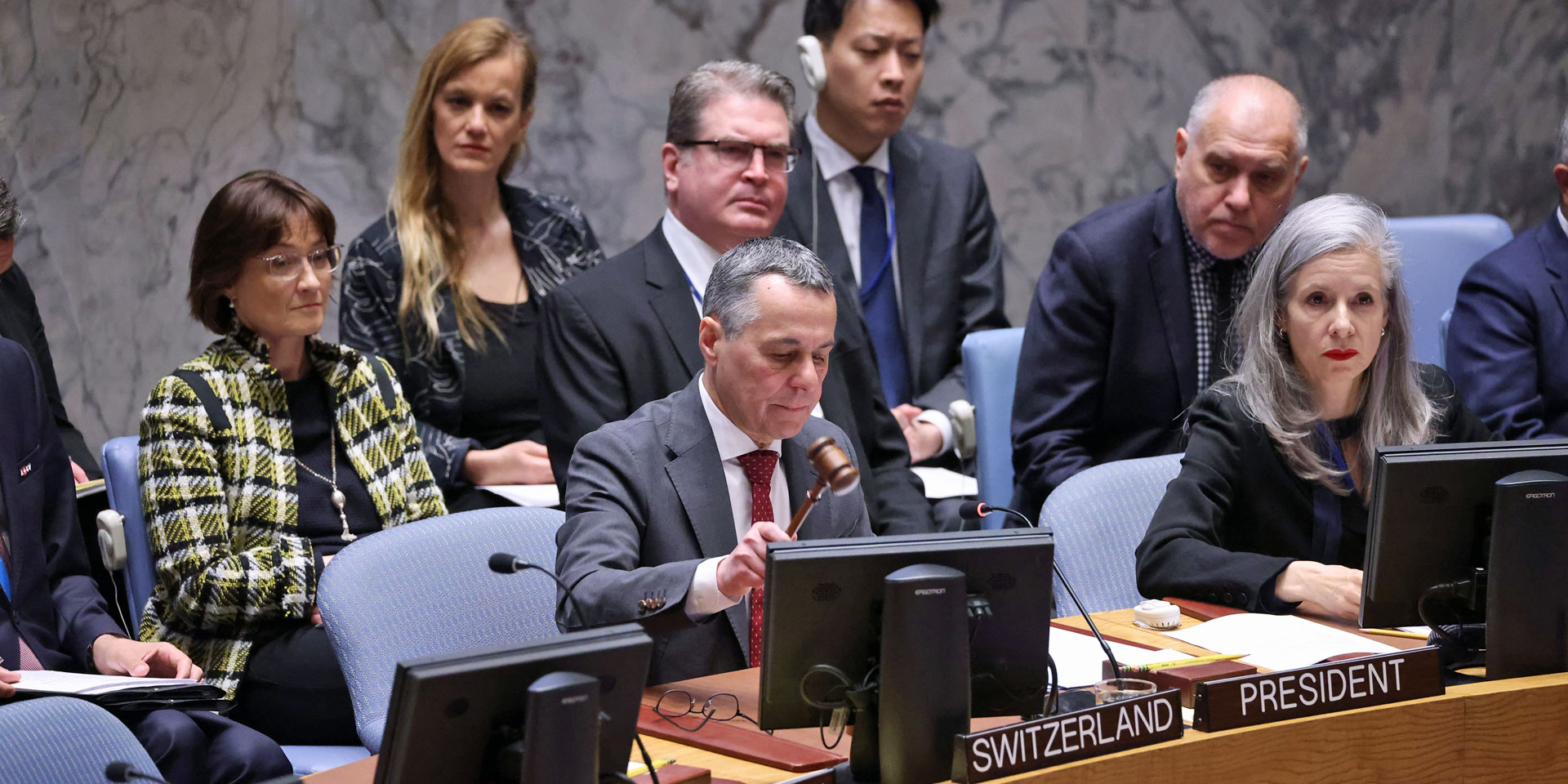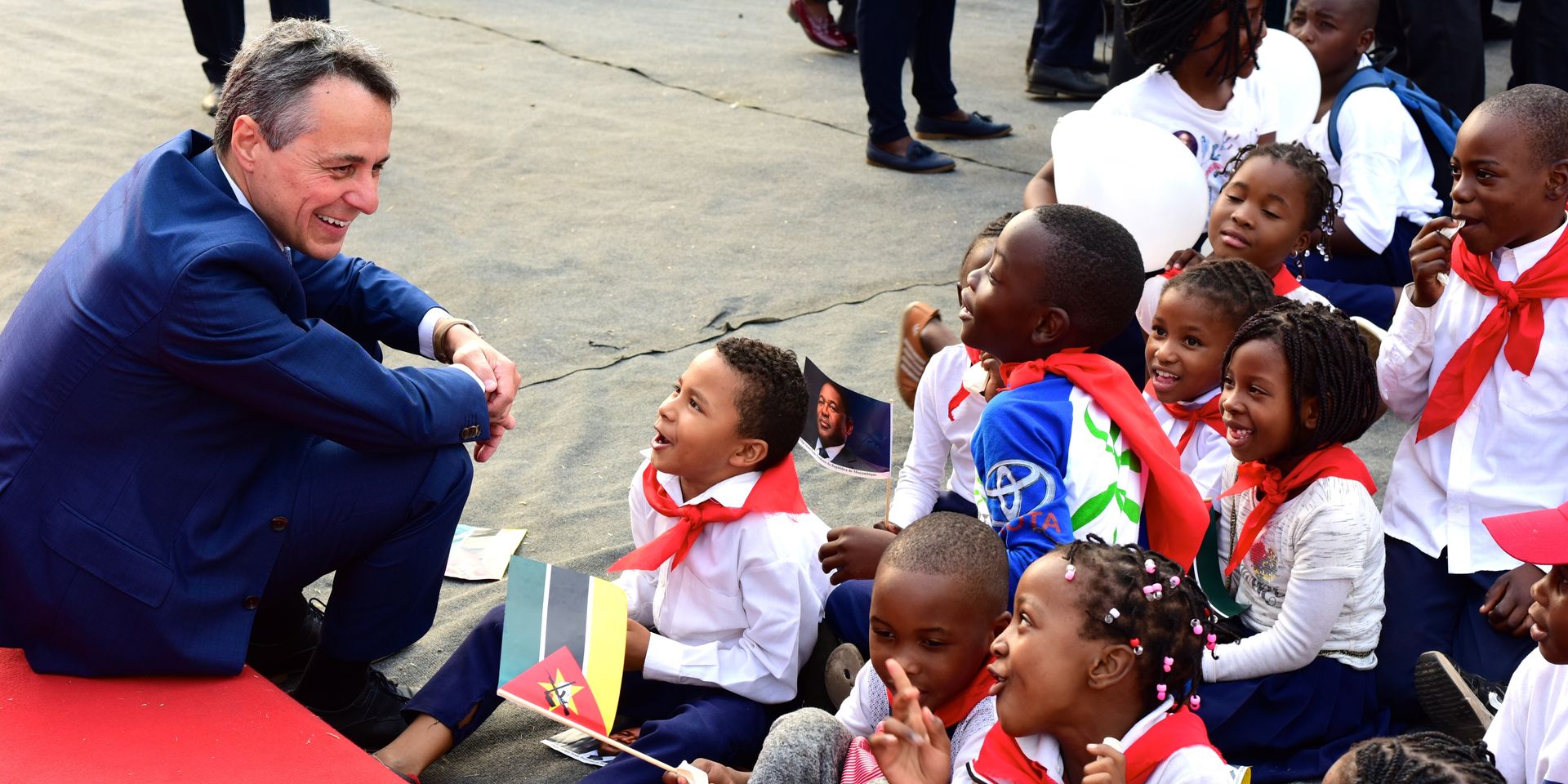Sudan: a man-made humanitarian disaster
The world has not faced such a large number of conflicts since the end of the Second World War. One of these has been ongoing in Sudan for over two years, with catastrophic consequences for the civilian population. More than half of the population is now affected by hunger. Millions of people have been displaced. Switzerland is committed, within the framework of its international cooperation, peace promotion and within the UN, to ending the war and mitigating its humanitarian consequences.
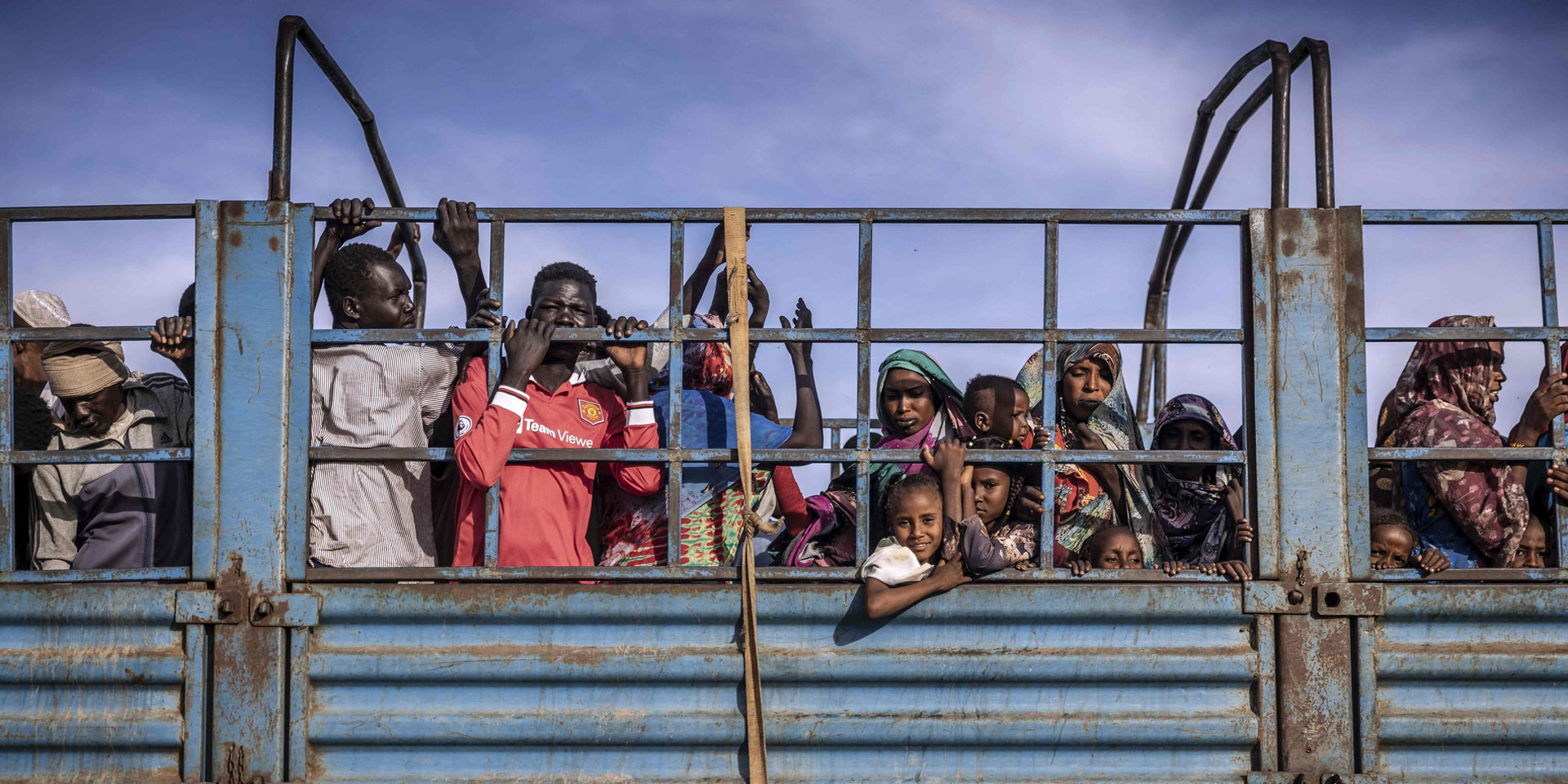
The war in Sudan, which began a year ago, has triggered one of the largest refugee movements in the world. More than 8.6 million people are on the run from the hostilities. © Keystone
20.08.2025 – Joint statement by the ALPS coalition on the humanitarian situation in Sudan
As a member of the ALPS coalition, Switzerland has signed a joint statement (PDF, 2 Pages, 186.9 kB, English) calling for urgent measures to address the dire humanitarian situation in Sudan. The ALPS coalition condemns in particular the growing number of people suffering from severe malnutrition and famine, as well as the numerous obstacles delaying or blocking the delivery of aid to key areas.
‘The parties to the conflict must take urgent measures to protect civilians and allow and facilitate humanitarian access to those in need, in accordance with their obligations under international humanitarian law and their commitments under the Jeddah Declaration on Commitment to Protect Civilians in Sudan, signed in May 2023,’ the text states.
Since April 2023, war has been raging in Sudan. It has caused one of the world's largest humanitarian crises. The civilian population is the first to be affected by this war.
The ALPS coalition's call includes the removal of all bureaucratic obstacles that hinder and prevent humanitarian activities, as well as guarantees that humanitarian actors can carry out their work safely – and without fear of reprisals – throughout Sudan, and that all civilians in need have access to humanitarian aid.
The ALPS coalition also calls on the parties to the conflict to commit to keeping open the main supply routes for humanitarian convoys and personnel, including through humanitarian pauses and other arrangements if necessary. There is an urgent need to allow a sustained UN humanitarian presence throughout the country, particularly in Darfur and the Kordofan regions. Access to telecommunications in all regions of Sudan must be restored and the protection of essential civilian infrastructure ensured, in particular energy, water and health infrastructure.
The coalition strongly reaffirms that international humanitarian law must be fully respected. This includes the obligation to protect civilians, including humanitarian personnel, their premises and property, as well as to allow and facilitate rapid and unimpeded access for humanitarian assistance to all people in need.
What is the ALPS Coalition?
At the initiative of the United States, the FDFA hosted a ceasefire conference in Switzerland in August 2024. However, the non-appearance of one of the parties to the conflict at the time made it impossible to hold ceasefire talks. The conference therefore focused on humanitarian access and the protection of the civilians caught up in the war. These talks led to the formation of a diplomatic coalition known as ALPS (Aligned for Advancing Life-Saving and Peace in Sudan), which includes the United States, Switzerland, the United Arab Emirates, the Kingdom of Saudi Arabia, Egypt, the United Nations and the African Union. Through its joint diplomatic efforts, the ALPS group has since been able to obtain concrete commitments from the parties to the conflict. These include opening border crossings for the transport of humanitarian aid from Chad, allowing humanitarian flights, and the introduction of stricter rules for the protection of the civilian population by the Rapid Support Forces. Switzerland continues to work within the framework of the ALPS group to advance the implementation of these commitments on the ground.
Joint Statement – ALPS Coalition, 20.08.2025 (PDF, 2 Pages, 186.9 kB, English)
04.06.2025 – Sudan: ALPS statement on the attack on a UN aid convoy
As part of the ALPS coalition, Switzerland has issued a statement (PDF, 1 Page, 112.8 kB, English)condemning the attack on a humanitarian aid convoy in Sudan in which five UN staff members were killed. ALPS expresses its condolences to the families and reminds everyone that such attacks are serious violations of international humanitarian law. In view of the dramatic situation in Sudan, the coalition calls for respect for international humanitarian law and for access to be guaranteed for aid organisations.
Statement by the ALPS coalition, 04.05.2025 (PDF, 1 Page, 112.8 kB, English)
15.04.2025 - Ministerial Sudan Conference in London
A delegation led by SDC Director-General Patricia Danzi, and consisting of the Swiss Special Representative for the Horn of Africa, Sylvain Astier, and the Deputy Head of the Peace and Human Rights Division at the FDFA, Sybille Obrist, took part in the Sudan Conference in London on 15 April 2025. The ministerial meeting provided a platform for discussing the conflict in Sudan and its devastating humanitarian consequences. The aim of the conference was to mobilise international attention and support, develop a common international position on conflict resolution and identify concrete steps for better humanitarian access and more effective aid.
18.10.2024 - Sudan Joint Donor Statement
Humanitarian organizations are facing significant challenges in reaching those in need of aid in Sudan. The obstruction of humanitarian efforts has worsened food insecurity, with famine confirmed in Zamzam camp, home to 500,000 internally displaced people. In a joint statement, donor countries, including Switzerland, call for unimpeded humanitarian access to provide urgently required assistance.
Sudan Joint Donor Statement (en) (PDF, 2 Pages, 143.7 kB, English)
15.04.2025 - One year of conflict in Sudan
Violence escalated in Sudan, Africa's third-largest country by area with a population of around 46 million, in mid-April 2023, and an armed conflict has been raging there ever since. The ongoing fighting between the Sudanese Armed Forces (SAF) and the Rapid Support Forces (RSF), a paramilitary militia, has left thousands dead or injured. As a result of the conflict, the country is facing one of the worst man-made humanitarian disasters of our time: according to UN figures from early February 2024, around 25 million people in Sudan, including 14 million children, are in urgent need of humanitarian aid. Nearly 20 million face acute hunger. The country is suffering from severe shortages of essentials, particularly food, water, shelter and medical care.
The conflict has also triggered mass displacement. More than 8.6 million people have been forced to flee their homes, with around 2 million seeking refuge in neighbouring Chad, South Sudan, Egypt, Ethiopia and the Central African Republic. Switzerland is actively engaged in mitigating the consequences of the conflict in Sudan and the wider region through its international cooperation, peacebuilding efforts, and multilateral efforts, leveraging its influence within the UN Security Council.
Direct support for people on the ground
Switzerland has provided direct support to those affected by the conflict in Sudan and the surrounding region through its international cooperation programmes, allocating CHF 64 million in 2023. The SDC maintains a presence in Juba, South Sudan. In 2023, it provided additional funding of CHF 18.1 million to support its partner organisations, primarily UN agencies, the Norwegian Refugee Council and the ICRC, in addressing humanitarian needs. Activities are focused on border areas where large numbers of refugees are arriving. One example is the town of Renk in the north-east of South Sudan, which has become a sanctuary for large numbers of refugees from Sudan.
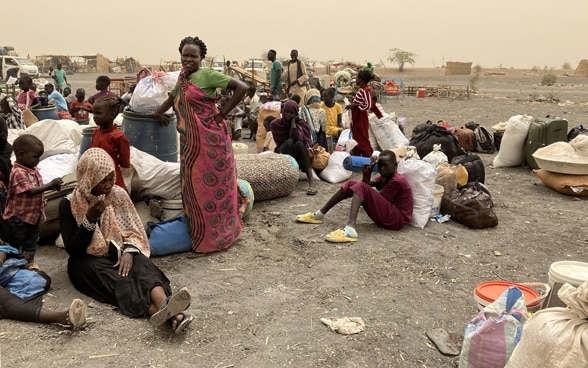
Over 730,000 Sudanese nationals have fled to the neighbouring state of Chad, which is itself affected by political instability and economic hardship. In N'Djamena, the capital of Chad, the SDC has provided funds totalling CHF 11.2 million to support Sudanese refugees in eastern Chad, focusing its aid on health, education and food security.
Peace diplomacy
Switzerland has a long tradition of providing good offices in Sudan. In January 2002, for example, it hosted ceasefire negotiations at the Bürgenstock resort in the canton of Nidwalden and made a significant contribution to bringing an end to the decades-long civil war under the 2005 peace agreement. Switzerland remains actively engaged in offering its good offices in Sudan. Through its peace diplomacy instruments and its special envoy for the Horn of Africa, Switzerland is working in particular to create opportunities for inclusive dialogue aimed at finding a political solution to the conflict.
Commitment to peace and international humanitarian law at the UN
Switzerland is also working at the multilateral level to promote peace, ensure the protection of the civilian population, improve the humanitarian situation and find a political solution to the conflict in Sudan. As a non-permanent member of the UN Security Council, Switzerland supported a resolution on 7 March 2024 calling for an immediate end to hostilities and urging the parties to the conflict to work towards a sustainable solution, fully comply with international humanitarian law, and allow safe, rapid, and unhindered access for humanitarian aid.
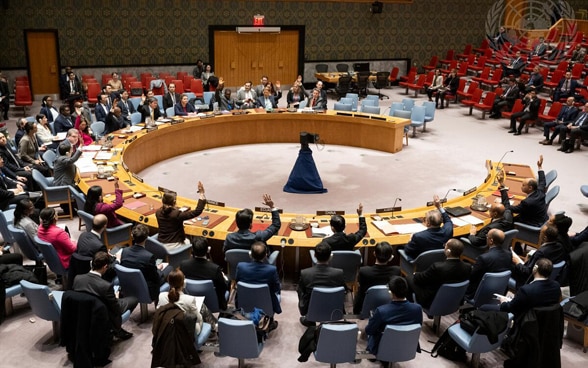
"We reiterate our urgent appeal to the Sudanese Armed Forces and the Rapid Support Forces to immediately cease hostilities, comply with their obligations under international law and protect the civilian population," said the Swiss embassador to the UN, Pascale Baeriswyl, at a Security Council briefing on the situation in Sudan on 7 March 2024. In New York, Switzerland also called on the parties to the conflict to immediately resume ceasefire negotiations and political dialogue.
International donors conference in Paris
An international donors conference organised by France, Germany and the EU was held in Paris on 15 April 2024 to address the humanitarian emergency in Sudan. Switzerland was represented at the conference by Ambassador Nicolas Randin, SDC assistant director general and head of the Sub-Saharan Africa Division. The conference had two goals: first, to send a political signal calling on the parties to the conflict to respect international humanitarian law and provide urgently needed humanitarian access and, second, to mobilise financial contributions from the international community to fund humanitarian aid to Sudan in 2024. Switzerland pledged CHF 19 million.

